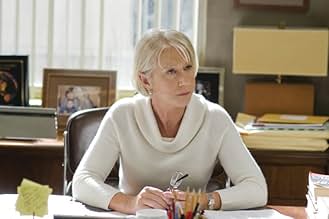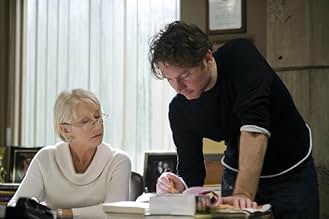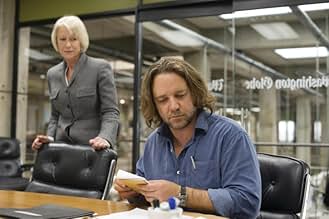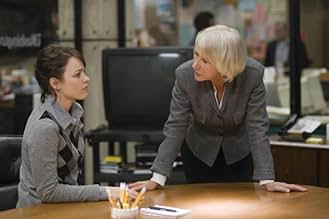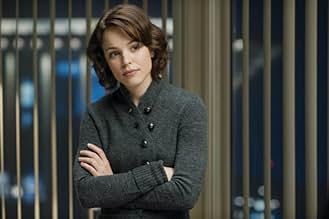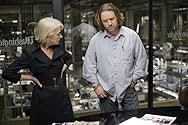When a congressional aide is killed, a Washington, D.C. journalist starts investigating the case involving the Representative, his old college friend.When a congressional aide is killed, a Washington, D.C. journalist starts investigating the case involving the Representative, his old college friend.When a congressional aide is killed, a Washington, D.C. journalist starts investigating the case involving the Representative, his old college friend.
- Awards
- 2 wins & 4 nominations total
Robin Wright
- Anne Collins
- (as Robin Wright Penn)
Steve Park
- Chris Kawai
- (as Stephen Park)
Featured reviews
In 'State of Play' the surprises keep coming. A politician's staff-member has been murdered and two journalists set out to discover the 'Who' (who killed her) and the 'Why'. We go down one alley, then another, all our beliefs challenged, then changed, but throughout it all our interest remains pretty high.
But then ... then something happens. One of the characters says something that she could not possibly know about, and this re-arranges all the assumptions we have made about guilty parties. Which is fine. But for one thing. The character who made the telling statement all but disappears from the film. She is not guilty. And the someone who is guilty is not the person who made the statement. And so the question is, what really happened here? I don't know. And I should know, because that's what the film was leading up to. Who Done It? Easy. Yes?
Russel Crowe is fine as one journalist, Rachel McAdam is superb as his younger associate. Ben Affleck is his usual stoic self, though it works in this role. Helen Mirren is shrill - too shrill - in her role as the newspaper's managing editor. For fans of Robin Wright - and there are many - she's fine as the wife of the Affleck character; thrown over for someone younger.
Finally, the film is - how to say? - flabby. It's not as tight as it should be. It goes off on tangents that lead nowhere at times when we should be tightening up the script and the tension. Also, it's kind of 'old fashioned'; the sort of plucky-young-journalist film they don't make anymore.
Anyway, it made for an entertaining evening. And that's more than merely O.k.
But then ... then something happens. One of the characters says something that she could not possibly know about, and this re-arranges all the assumptions we have made about guilty parties. Which is fine. But for one thing. The character who made the telling statement all but disappears from the film. She is not guilty. And the someone who is guilty is not the person who made the statement. And so the question is, what really happened here? I don't know. And I should know, because that's what the film was leading up to. Who Done It? Easy. Yes?
Russel Crowe is fine as one journalist, Rachel McAdam is superb as his younger associate. Ben Affleck is his usual stoic self, though it works in this role. Helen Mirren is shrill - too shrill - in her role as the newspaper's managing editor. For fans of Robin Wright - and there are many - she's fine as the wife of the Affleck character; thrown over for someone younger.
Finally, the film is - how to say? - flabby. It's not as tight as it should be. It goes off on tangents that lead nowhere at times when we should be tightening up the script and the tension. Also, it's kind of 'old fashioned'; the sort of plucky-young-journalist film they don't make anymore.
Anyway, it made for an entertaining evening. And that's more than merely O.k.
A gruff old-school reporter (Russell Crowe playing his A-game) becomes personally entangled in a breaking news story surrounding his old college buddy turned congressman (Ben Affleck, not as bad as you would think) and a young female aid who died under mysterious circumstances in the surprisingly plausible political thriller "State of Play" from director Kevin MacDonald who was previously responsible for "The Last King of Scotland". Though designed as a throw-back to paranoid investigative thrillers from the 1970's, relevance is gained when the massive cover-up revealed becomes a vehicle for the filmmakers to explore the death of print news at the hand of digital mediums.
The twisty and engaging screenplay is credited to three scribes: Matthew Michael Carnahan, Tony Gilroy and Billy Ray. But it's Gilroy's fingerprints that shape the story with all the overlapping dialogue and conspiracy talk that will remind many of his "Michael Clayton". Adapted from a sprawling BBC miniseries created by Paul Abbott, the trio is especially deft in their condensing of the story into a fully digestible two hours. Even as new characters and twists keep coming, the audience is never left out in the cold. They also give the cast plenty to chew on with some great throw-away lines amidst all the posturing between the cops, reporters, politicians and sleaze-bags.
Though it's Crowe and Helen Mirren as his sparring and quick-witted boss who shine the most, this is essentially an ensemble piece, and it's especially clever when Jason Bateman arrives on screen for a few pivotal scenes as a smug public relations guru who's too dumb to realize he knows too much. The cast also includes Robin Wright Penn as Affleck's wife, Jeff Daniels as the arrogant majority whip and Harry Lennix, who as a D.C. detective makes a compelling case here for the lead role in the Barack Obama Story. The only miscalculation in the casting is poor Rachel McAdams, lovely but annoying in her high-pitch as Crowe's blogging tag-along looking to kick it old-school and get something in print.
By the third act "State of Play" overplays its hand in its attempts to be timely with too much talk of the privatization of the military, Capitol Hill sex scandals and traditional newspapers losing out in the digital age to bloggers more concerned with gossip than real journalism. It could've also been more subtle in its preaching about the importance of serious investigative reporting. It should be commended, however, for an otherwise smart screenplay that doesn't spell out all its twists and turns too early and the well polished cast who give the film a slick sheen. Even though it might be reporting on yesterday's news, "State of Play" still makes for solid rainy day entertainment and is worthy of blogging about.
The twisty and engaging screenplay is credited to three scribes: Matthew Michael Carnahan, Tony Gilroy and Billy Ray. But it's Gilroy's fingerprints that shape the story with all the overlapping dialogue and conspiracy talk that will remind many of his "Michael Clayton". Adapted from a sprawling BBC miniseries created by Paul Abbott, the trio is especially deft in their condensing of the story into a fully digestible two hours. Even as new characters and twists keep coming, the audience is never left out in the cold. They also give the cast plenty to chew on with some great throw-away lines amidst all the posturing between the cops, reporters, politicians and sleaze-bags.
Though it's Crowe and Helen Mirren as his sparring and quick-witted boss who shine the most, this is essentially an ensemble piece, and it's especially clever when Jason Bateman arrives on screen for a few pivotal scenes as a smug public relations guru who's too dumb to realize he knows too much. The cast also includes Robin Wright Penn as Affleck's wife, Jeff Daniels as the arrogant majority whip and Harry Lennix, who as a D.C. detective makes a compelling case here for the lead role in the Barack Obama Story. The only miscalculation in the casting is poor Rachel McAdams, lovely but annoying in her high-pitch as Crowe's blogging tag-along looking to kick it old-school and get something in print.
By the third act "State of Play" overplays its hand in its attempts to be timely with too much talk of the privatization of the military, Capitol Hill sex scandals and traditional newspapers losing out in the digital age to bloggers more concerned with gossip than real journalism. It could've also been more subtle in its preaching about the importance of serious investigative reporting. It should be commended, however, for an otherwise smart screenplay that doesn't spell out all its twists and turns too early and the well polished cast who give the film a slick sheen. Even though it might be reporting on yesterday's news, "State of Play" still makes for solid rainy day entertainment and is worthy of blogging about.
I cannot describe how much I enjoy a good investigative reporting story, and State of Play really scratched that itch. It also combines that kind of story-telling with the idea of a few people trying to blow the lid on a massive conspiracy that may put their lives in danger, which is another style of film that I love. I was thrilled through most of State of Play, and didn't even care that there were some predictable aspects to the story, because it's not always about finding out whodunnit but seeing how they will be caught. Russell Crowe delivered his same performance he always gives, but it didn't bother me too much here since I was deeply invested in the plot (although I did find myself wondering how much more I'd enjoy it with a better actor.) The rest of the cast did marvelous work, and helped make the entire film more impactful. I even found Ben Affleck to be a good casting choice (for once) because he has the right kind of smarminess that I'd expect from that kind of politician.
For a long time I was convinced that State of Play was going to be one of those legendary films that ticks all the boxes for me, and would become a favorite I'd watch again and again. However, there were a couple of things that held it back from greatness for me, and left me just a little disappointed at the end. First of all, there was a slight interpersonal relationship dynamic between some of the characters that felt unnecessary and detracted from the story for me in a small way. It wasn't terrible, but it came across as pointless baggage they were adding to the characters that didn't enhance the plot in any way. Finally, there's the ending. While I can't dig into any details without touching on spoilers, I'll just say that it did too much to reframe the entire plot of the film, and created more questions than answers. It genuinely took me to a place where I no longer knew how to feel about the resolution of State of Play. I didn't need that twist, and it left me conflicted about a movie I was loving up to that point.
For a long time I was convinced that State of Play was going to be one of those legendary films that ticks all the boxes for me, and would become a favorite I'd watch again and again. However, there were a couple of things that held it back from greatness for me, and left me just a little disappointed at the end. First of all, there was a slight interpersonal relationship dynamic between some of the characters that felt unnecessary and detracted from the story for me in a small way. It wasn't terrible, but it came across as pointless baggage they were adding to the characters that didn't enhance the plot in any way. Finally, there's the ending. While I can't dig into any details without touching on spoilers, I'll just say that it did too much to reframe the entire plot of the film, and created more questions than answers. It genuinely took me to a place where I no longer knew how to feel about the resolution of State of Play. I didn't need that twist, and it left me conflicted about a movie I was loving up to that point.
Good thriller with some excellent performances. Russell Crowe is suitably grizzled as the been around reporter and Helen Mirren is wonderfully tough as his editor, the problem is the casting of Ben Affleck. He gives a good enough performance but is far too young to be believable as Crowe's college roommate or Robin Wright Penn's husband, not his fault but a major casting error nonetheless. Originally Crowe and Affleck's parts were to be filled by Brad Pitt and Edward Norton a far more simpatico pairing the obvious disparity in the leads ages distracts throughout the film. Jason Bateman shows up late in the movie to offer up a fun, out there performance as a sleaze. The story itself does move along and offers some nice tension and twists.
Congressman Stephen Collins (Ben Affleck) is helping with the government investigation of a shady military-based company when he receives word that his mistress has committed suicide. Visually distraught, he leaves a hearing in tears and sets off a media circus. Seasoned reporter Cal McAffrey (Russell Crowe) was his roommate in college, and the two have remained friends. In a bid to quash the political blogging of junior reporter Della Frye (Rachel McAdams), McAffrey sets out to find the truth about the story.
State of Play sets itself up early on to be a cookie-cutter, predictable thriller. But as the film progresses, it rather quickly becomes the twisty and conniving thriller it needs to be. Despite being heavily dialogue driven, the film is an intense ride that will keep people on edge throughout. Some scenes are downright terrifying in their amped up suspense and political intrigue. This film really set out to be tense, and succeeds wonderfully. It knows just what punches to pull, and when to pull them.
The script, written by political scribes Matthew Michael Carnahan, Tony Gilory and Billy Ray, is insight and intriguing. It could have easily been made boring and inundated with rehashed politicalisms (like all of their last films), but this film revels in how interesting it becomes. It has laughs strung throughout (a genuine surprise), and lacks the nerve to become loaded to the brim with facts and innuendos. Instead, it expertly weaves between scenes, amping up the intensity of some scenes, and downplaying others.
But this is mainly due to the incredible performances by the cast. Crowe (who I usually loathe) and Affleck are simply outstanding in their roles. Age issues aside, both play their character with finesse and charisma. Affleck looks and acts like a confused wet-behind-the-ears, gunning-for-higher-office political pawn from beginning to end. Some of the reactions on his face are downright devastating in how excellently they are conveyed. And this is a guy critics once said could not act. Coupled with one-two shot of acting in Hollywoodland and directing Gone Baby Gone, we may be seeing a renewed resonance and importance for the Oscar-winner. Crowe on the other hand, delivers his strongest performance in years. While he has been downplayed and underused in his last few films, he carries this film. He is stubborn and vaguely likable, but he makes his character work for all of his idiosyncrasies and ethically-questionable tactics. He makes a seasoned journalist look like an amateur.
McAdams, all but a ghost recently, holds her own against the two heavy-hitters and delivers a performance that is both inspired and emotional. It gives her a lot of room to act, and she delivers in every instance. The rest of the cast is a bit mixed however, as so little of them is given that much to do. Harry Lennix, Robin Wright Penn, Jeff Daniels, the horrifying Michael Berresse and especially Jason Bateman, all deliver noteworthy performances, but never get to really shine in them. They all have their traits and motivations, but get little screen time to truly express them. They each are developed quite strongly, but they lack the movement afforded to Crowe, Affleck and McAdams. I simply loved Helen Mirren's scenery-gauging editor and all of her subtleties. But she too, is downplayed to the point of almost barely being in the film.
Despite its intensity, the film is bogged down by its dialogue-heavy scenes and consistent character additions. It is easy to keep track of everyone, but so many people are introduced that the film loses its focus on more than one occasion. It makes for a few scenes that are merely filler between the scenes of useful heavy acting. It just feels so tiring. I understand now how daunting a task it must have been to convert six hours of British television into a 127-minute film, but there are scenes that are just too easy to not have been cut out (some entire mildly useful subplots may have helped). Adding characters in makes sense for a story about two journalists frantically searching to lift the lid on a story, but there needs to be more emphasis on what was needed and not needed. A brilliant montage in the middle of the film goes almost entirely to waste because the filmmakers lack the knowledge of what should be cut. Limiting the preposterous and silly climax could have also done wonders. The scenes that are left in the film (including the finale) are great, but they could have been stronger if they were as tightly wound as the film wants itself to be. A little less shaky hand camera movement could have also significantly benefited the film.
Even with its problems, it is clear from the on-set of the first shot in the bullpen at the Washington Globe that the filmmakers are going for a very keen sense of homage to All the President's Men. While the on-going and very professional relationship between McAffrey and Frye is very similar to Woodward and Bernstein, the fabric of journalistic integrity and researching are the core of State of Play. The film is loaded with allusions to the Oscar-winning film, and even mimics shots right out of the film. While it is obvious for anyone who has seen Men, this film's nods are done in such a delicate and unique way that they never become distracting or blatant. The film is its own, and does not ever feel like it is living in its big-brother's shadow. It is a fresh take on old-fashioned reporting in a very digital age, and frequently walks the tight line of old versus new.
State of Play looked interesting, and surprisingly delivers on almost every count. It is not a perfect film, but it is a solid example of great film-making. It wants to be more, but seems content at being a twisty and suspenseful modern thriller.
8/10.
State of Play sets itself up early on to be a cookie-cutter, predictable thriller. But as the film progresses, it rather quickly becomes the twisty and conniving thriller it needs to be. Despite being heavily dialogue driven, the film is an intense ride that will keep people on edge throughout. Some scenes are downright terrifying in their amped up suspense and political intrigue. This film really set out to be tense, and succeeds wonderfully. It knows just what punches to pull, and when to pull them.
The script, written by political scribes Matthew Michael Carnahan, Tony Gilory and Billy Ray, is insight and intriguing. It could have easily been made boring and inundated with rehashed politicalisms (like all of their last films), but this film revels in how interesting it becomes. It has laughs strung throughout (a genuine surprise), and lacks the nerve to become loaded to the brim with facts and innuendos. Instead, it expertly weaves between scenes, amping up the intensity of some scenes, and downplaying others.
But this is mainly due to the incredible performances by the cast. Crowe (who I usually loathe) and Affleck are simply outstanding in their roles. Age issues aside, both play their character with finesse and charisma. Affleck looks and acts like a confused wet-behind-the-ears, gunning-for-higher-office political pawn from beginning to end. Some of the reactions on his face are downright devastating in how excellently they are conveyed. And this is a guy critics once said could not act. Coupled with one-two shot of acting in Hollywoodland and directing Gone Baby Gone, we may be seeing a renewed resonance and importance for the Oscar-winner. Crowe on the other hand, delivers his strongest performance in years. While he has been downplayed and underused in his last few films, he carries this film. He is stubborn and vaguely likable, but he makes his character work for all of his idiosyncrasies and ethically-questionable tactics. He makes a seasoned journalist look like an amateur.
McAdams, all but a ghost recently, holds her own against the two heavy-hitters and delivers a performance that is both inspired and emotional. It gives her a lot of room to act, and she delivers in every instance. The rest of the cast is a bit mixed however, as so little of them is given that much to do. Harry Lennix, Robin Wright Penn, Jeff Daniels, the horrifying Michael Berresse and especially Jason Bateman, all deliver noteworthy performances, but never get to really shine in them. They all have their traits and motivations, but get little screen time to truly express them. They each are developed quite strongly, but they lack the movement afforded to Crowe, Affleck and McAdams. I simply loved Helen Mirren's scenery-gauging editor and all of her subtleties. But she too, is downplayed to the point of almost barely being in the film.
Despite its intensity, the film is bogged down by its dialogue-heavy scenes and consistent character additions. It is easy to keep track of everyone, but so many people are introduced that the film loses its focus on more than one occasion. It makes for a few scenes that are merely filler between the scenes of useful heavy acting. It just feels so tiring. I understand now how daunting a task it must have been to convert six hours of British television into a 127-minute film, but there are scenes that are just too easy to not have been cut out (some entire mildly useful subplots may have helped). Adding characters in makes sense for a story about two journalists frantically searching to lift the lid on a story, but there needs to be more emphasis on what was needed and not needed. A brilliant montage in the middle of the film goes almost entirely to waste because the filmmakers lack the knowledge of what should be cut. Limiting the preposterous and silly climax could have also done wonders. The scenes that are left in the film (including the finale) are great, but they could have been stronger if they were as tightly wound as the film wants itself to be. A little less shaky hand camera movement could have also significantly benefited the film.
Even with its problems, it is clear from the on-set of the first shot in the bullpen at the Washington Globe that the filmmakers are going for a very keen sense of homage to All the President's Men. While the on-going and very professional relationship between McAffrey and Frye is very similar to Woodward and Bernstein, the fabric of journalistic integrity and researching are the core of State of Play. The film is loaded with allusions to the Oscar-winning film, and even mimics shots right out of the film. While it is obvious for anyone who has seen Men, this film's nods are done in such a delicate and unique way that they never become distracting or blatant. The film is its own, and does not ever feel like it is living in its big-brother's shadow. It is a fresh take on old-fashioned reporting in a very digital age, and frequently walks the tight line of old versus new.
State of Play looked interesting, and surprisingly delivers on almost every count. It is not a perfect film, but it is a solid example of great film-making. It wants to be more, but seems content at being a twisty and suspenseful modern thriller.
8/10.
Did you know
- TriviaThe scene in which Cal (Russell Crowe) orders lunch, but is then interrupted by his bag getting stolen, was shot at Ben's Chili Bowl, a real Washington, D.C. lunch counter that has been open on U Street NW since 1958.
- GoofsIn the final scene of the printing montage at the end, the sign on the side of the truck says "Washington Post".
- Quotes
Cameron Lynne: I want you to do a complete rundown on this Sonia Baker: who she knew, who she blew, the color of her knickers.
- Crazy creditsThe printing process of a newspaper is shown as the ending credits start to show up.
- ConnectionsFeatured in Screenwipe: Episode #5.3 (2008)
- SoundtracksThe Night Pat Murphy Died
(Traditional)
Arranged by Alan Doyle, Bob Hallett (as Robert Hallett), Séan McCann, Darrell Power
Performed by Great Big Sea
Courtesy of Sonic Entertainment Group and Warner Music Canada Co.
Details
- Release date
- Countries of origin
- Official site
- Languages
- Also known as
- Los secretos del poder
- Filming locations
- Production companies
- See more company credits at IMDbPro
Box office
- Budget
- $60,000,000 (estimated)
- Gross US & Canada
- $37,017,955
- Opening weekend US & Canada
- $14,071,280
- Apr 19, 2009
- Gross worldwide
- $87,812,371
- Runtime2 hours 7 minutes
- Color
- Sound mix
- Aspect ratio
- 2.35 : 1
Contribute to this page
Suggest an edit or add missing content







